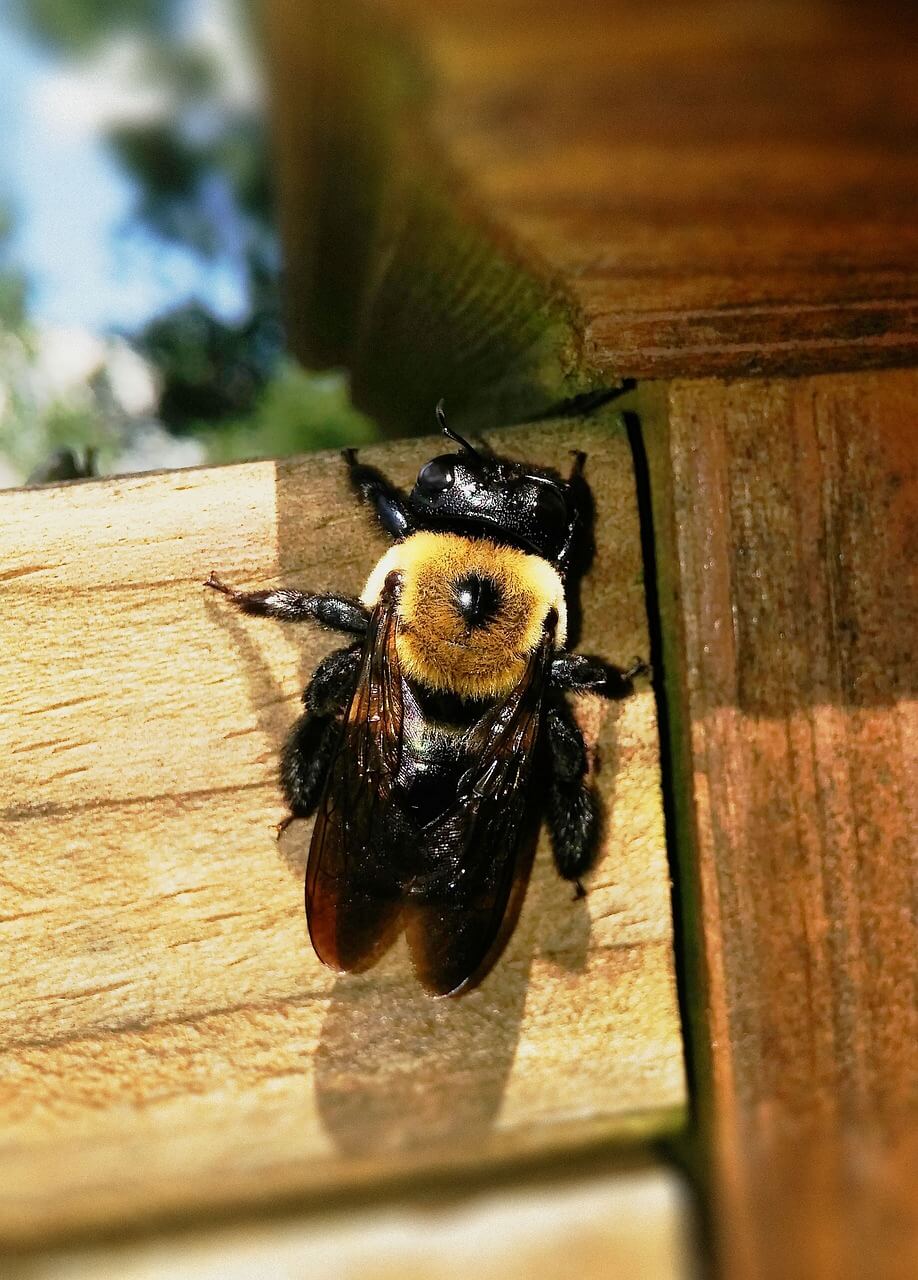Carpenter bees are fascinating creatures that play a vital role in pollination, but they can also be a nuisance when they decide to make their homes in the wooden structures of your property. In Canton, Georgia, these bees are plentiful and listening to the sound of them destroying your deck or home is not fun. Carpenter bees can do damage and become a yearly nuisance unless you are proactive. This will describe the habits of carpenter bees and explore some strategies for managing them in Canton, GA.
Understanding Carpenter Bee Habits
Carpenter bees are often mistaken for bumblebees due to their similar appearance, but they differ in behavior and nesting habits. Unlike bumblebees, which typically nest in the ground, carpenter bees prefer to excavate tunnels in wood to create their nests. They are attracted to unpainted or weathered softwoods such as cedar, pine, and redwood, making wooden structures like eaves, decks, and siding prime targets for nesting sites. Even treated wood does not deter the carpenter bee.
Female carpenter bees are responsible for tunneling into wood to lay their eggs. They use their strong mandibles to bore perfectly circular entrance holes, typically about half an inch in diameter. Once inside, they create galleries where they lay their eggs and provision them with pollen as food for the developing larvae. Signs of a carpenter bee hole is fresh sawdust under the hole and a sappy looking substance next to the hole usually going downward.
Male carpenter bees, while territorial and aggressive towards other insects and perceived threats, do not possess stingers and are incapable of causing harm to humans.
Control Methods for Carpenter Bees in Canton, GA
Protective Measures:
One of the most effective strategies for managing carpenter bees is to take preventive measures to protect wooden structures. This includes painting or staining all exposed wood surfaces to make them less appealing to nesting females. Additionally, filling existing entrance holes with wood putty or caulking can deter bees from reusing the same tunnels.
Physical Barriers:
Installing physical barriers such as wire mesh or hardware cloth over vulnerable areas can prevent carpenter bees from accessing potential nesting sites. These barriers should be securely attached to the wood surface to prevent the bees from finding gaps to enter.
Professional Treatment:
In severe infestations or if preventive measures prove ineffective, seeking professional pest control services may be necessary. 120 Pest control experts can assess the extent of the infestation and recommend appropriate treatment options, such as insecticidal dusts or aerosol sprays targeted at eliminating carpenter bee populations.
Natural Predators:
Encouraging natural predators of carpenter bees, such as woodpeckers, can help keep populations in check. Providing birdhouses and maintaining a bird-friendly environment can attract woodpeckers and other insect-eating birds to your property.
Trap Nesting Boxes:
Setting up trap nesting boxes can lure carpenter bees away from wooden structures and provide them with alternative nesting sites. These boxes mimic natural nesting conditions and can be filled with replaceable wooden blocks that the bees will tunnel into, allowing for easy removal and disposal of infested wood.
Not Doing Anything:
Doing nothing will allow the circle to continue of bees damaging your home to lay their eggs. While nothing can 100% prevent a carpenter bee from damaging your home having a professional such as 120 Pest can stop the cycle.
The Bees Can Be Stopped:
Understanding the habits of carpenter bees and implementing effective control methods is essential for homeowners in Canton, GA, to protect their wooden structures from carpenter bee damage. By taking preventive measures, seeking professional assistance when needed, and utilizing natural control methods, homeowners can effectively manage carpenter bee populations and preserve the integrity of their property.
Contact 120 Pest today and talk to a knowledgeable professional about your carpenter bee issue.




